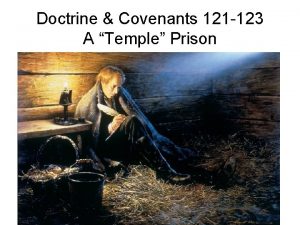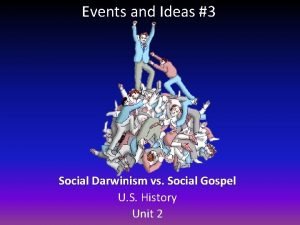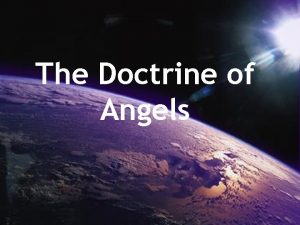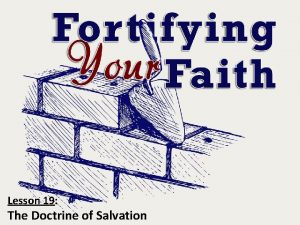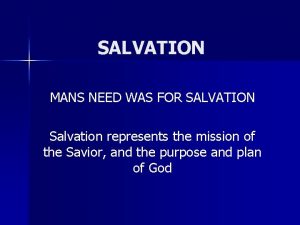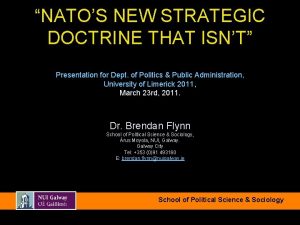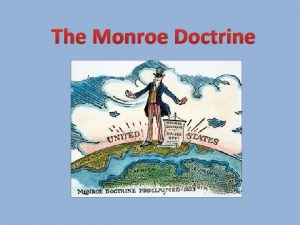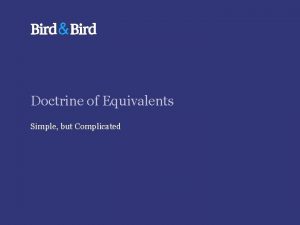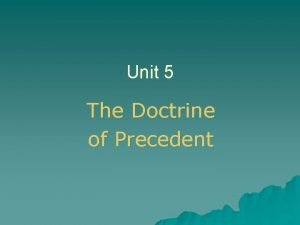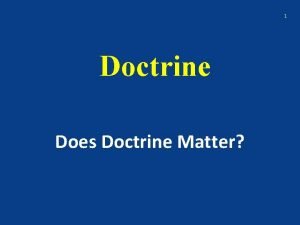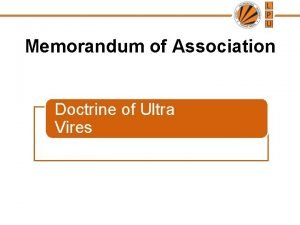The Doctrine of Salvation What salvation isnt Salvation






















































- Slides: 54

The Doctrine of Salvation

What salvation isn’t • Salvation is not casual. • Salvation cannot be reduced to three ABC’s on a page or four spiritual laws. • Salvation is not asking Jesus into your heart (Rev. 3: 20) or saying a Sinner’s prayer. • Salvation is not walking an aisle and shaking the preacher’s hand. • Salvation is not going to church or doing any other religious activity. • Salvation is not getting dipped in water, a feeling, or speaking in any tongue. • Salvation is not about YOU!

What Salvation is • Webster’s dictionary says ‘The redemption of man from the bondage of sin and liability to eternal death, and the conferring on him everlasting life. ’ • Salvation is the application of the work of Christ to the life of the individual. The goal of salvation is God’s supreme and ultimate glory which He rightly deserves. Salvation is about God. Lastly, salvation is found solely in the man and work of Jesus the Christ. • The most important question is not the meaning of life. It is Acts 16: 30.

The process of Salvation 1. Election-God’s choice of people to be saved 2. Gospel call-the proclamation that God uses to open the ears of sinners 3. Regeneration-being ‘born again’ or being ‘born of above’ 4. Conversion-repentance and faith 5. Justification-being made legally right in God’s sight 6. Adoption-the Father brings us into His family 7. Sanctification-right conduct of living 8. Perseverance-God keeps you 9. Death-we go to be with the Lord 10. Glorification-we are given resurrection bodies at His return

Election • Election is the most debated topic amongst Evangelicals today. The debate centers around God’s sovereignty and man’s response. • Election is somewhat mysterious because we don’t have all the answers. • Election is an act of God before the creation of the world in which He chooses some people to be saved; not on account of any foreseen merit in them, but only because His sovereign good pleasure. It is also called predestination.

Election in the Bible • In the Old Testament- Election can be seen when God chose the nation of Israel (Deu. 7: 6), Abraham (Neh. 9: 7), Isaac (Gen. 21: 12), and a host of other people and nations (Hag. 2: 23; Isa. 45: 5). • In the New Testament- Election is taught in various books (Acts 13: 48; Rom. 8: 28 -30; 9: 1113; Eph. 1: 4 -6; book of life). Election is always to the salvation of an individual and is a cause for praising God.

How the N. T. views election • Election is a comfort (Rom. 8: 28 -35). • Election is a reason to praise God (Eph. 1: 5 -6, 11 -12; 1 st Thess. 1: 4 -5; 2 nd Thess. 2: 13). • Election should give us encouragement for evangelism (2 nd Tim. 2: 10; Acts 18: 9 -10).

Misunderstanding/objections • Election is not based on God’s foreknowledge, but rather our faith. God looked into the future and saw that people would have faith so He predestined them to do so. ~This process of thought leads to a works or merits-based salvation. God’s work in election is to give confirmation to the decision He knows people will make (Rom. 8: 29). It is by GRACE. • Our faith is not the reason God chose us. God simply chose us for His glory stemming out of His great love for us (Rom. 9: 10 -13; Tit. 5: 4 -5).

Misunderstanding/objections • Election does not give people free choice to trust Christ. ~The doctrine of election is fully able to accommodate the idea that we have voluntary choice and we make willing decisions in accepting or rejecting Christ. Our choices are voluntary because they are what we want to do and what we decide to do. This doesn’t mean our choices are absolutely free though because God can work sovereignly through our desires so that he guarantees that our choices come about as he ordained them, but this can still be understood as a real choice because God has created us and he ordains that such a choice is real.

Misunderstanding/objections • The doctrine of election means that unbelievers never had a chance to believe. ~The Bible never explicitly says unbelievers did not have a chance to believe (John 8: 42 -44; Matt. 23: 37; John 5: 40; Rom. 1: 20, 3: 9 -18). In the end, who are we to question God (Rom. 9: 18 -24)? • Election is unfair. ~It would be perfectly fair for God to send everyone to Hell (Psa. 8: 3 -5). Is our fairness higher than His? Who are you (Rom. 9: 20 -24)?

Misunderstanding/objections • But-the Bible says that God wills to save everyone (1 Tim. 2: 4; 2 Pet. 3: 9). ~These verses speak of God’s revealed will (telling us what we should do), not his hidden will (his eternal plans for what will happen). The verses simply tell us that God invites and commands every person to repent and come to Christ for salvation, but they do not tell us anything about God’s secret decrees regarding who will be saved. Why isn’t everyone saved?

Reprobation • Reprobation is the sovereign decision of God before creation to pass over some people in sorrow (Eze 33: 11); deciding not to save them, but to punish theirs sins and thereby, manifest His justice (Prov. 16: 4 Jud. 4; Rom. 9: 17 -22; 11: 7; 1 Pet. 2: 8; Rev. 13: 7 -8; 17: 8). Reprobation brings God great sorrow. However, the blame for condemnation is always on the sinner. Never on God. John Calvin sums it up saying “Man therefore falls, God's Providence so ordaining, but he falls by his own fault. ” Judas and Pharaoh are two specific examples of reprobated people in Scripture.

Reprobation • In spite of the fact that we recoil against this doctrine, we must be careful about how we approach God and these passages. We must never begin to wish that the Bible was written in a different way, or that it did not contain these verses. Trust in God’s sovereignty and His decisions. God’s righteous justice is meant for His glory (Rom. 9: 22 -23). Though it makes us sorrowful, we are obliged to believe in it (Paul; Rom. 9: 1 -4).

Gospel Call • The gospel call is the call to obedience. It is a call out of the realm of sin and death to the realm of life in Christ (Rom. 8: 30; 1 Cor. 1: 2, 9; 1 Tim. 6: 12). • In the umbrella called the gospel call, there are two categories of calling: Effective calling and the general gospel call. Both are extremely important.

Effective calling • Effective calling is an act of God the Father, speaking through the human proclamation, in which, He summons people to Himself in such a way that they respond in saving faith (1 Pet. 5: 10; 2 Pet. 1: 3). It is basically God opening your heart to who He is through a preacher or presenter of the gospel. • Without God’s effective calling, no one would be saved (John 6: 44; Acts 16: 14; ). The desire or drive to seek God is of God and not of yourself. Effective calling is internal. It is commonly conviction. God is opening your heart and mind revealing who Jesus really is (Luke 24: 45; Matt. 11: 27).

Effective calling • When God effectively calls people in this powerful way, he calls them “out of darkness into his marvelous light” (1 Pet. 2: 9); he calls them “into fellowship with his Son” (1 Cor. 1: 9); and “into his own kingdom and glory” (1 Thes. 2: 12). People who have been called by God belong to Jesus Christ (Rom. 1: 6). They are called ‘saints’ (Rom. 1: 7), and have come into the realm of peace (1 Cor. 7: 15), freedom (Gal. 5: 13), hope (Eph. 1: 18), holiness (1 Thes. 4: 7), patient endurance of suffering (1 Pet. 2: 20 -21), and eternal life (1 Tim. 6: 12). No powerless human calling is in view with these verses.

General Gospel call • The general Gospel call is the basic Gospel we are called to carry out (Matt. 28: 18 -20; Rom. 10: 14; 2 Cor. 5: 20; 1 Cor. 15: 1 -4). These are where the basic ABC’s come in. We are called to preach the Gospel (Not manipulate people into conversion to mark off a notch on our spiritual belts).

Element 1 • Anyone who comes to Christ for salvation must have at least a basic understanding of who Christ is and how he meets our needs for salvation. 1) All people have sinned (Rom. 3: 23). 2)The penalty for our sin is death (Rom. 6: 23). 3) Jesus Christ has paid our penalty (Rom. 5: 8).

Elements 2 & 3 • People need to respond to Christ with faith and repentance (John 1: 11 -12; Acts 2: 3738; 3: 19; 5: 31; 20: 21; Rom. 2: 4; 2 Cor. 7: 10; Matt. 11: 28 -30; Rev. 22: 17). • Communicate to them the promise of forgiveness and eternal life (John 3: 16; 6: 37; Acts 2: 38; 3: 19).

Importance of the Gospel • The Gospel will penetrate every aspect of people: their intellect, their life, their will, their Everything (1 Cor. 1: 21 -24, 2: 14). • The Gospel is ‘the power of God for salvation to everyone who believes, to the Jew first and also to the Greek’ (Rom. 1: 16). We are not to be ashamed of the Gospel.

Regeneration • Regeneration is the secret act of God, in which, He imparts new spiritual life to us. It is called being ’born again’ or being ’born from above’ in the Bible (John 3: 3, 5 -8). • There are four areas of regeneration we need to address.

Areas 1 -3 • Regeneration is totally a work of God (John 1: 1213; 1 Pet. 1: 13; ). Regeneration and the effective calling are Ezek. 36: 26 -27 simultaneous (1 Pet. 1: 23; Jas 1: 18; Acts 10: 44). • The exact nature of regeneration is mysterious to us (John 3: 8; Eph. 2: 4 -5; Col. 2: 14). You are completely a new person (2 Cor. 5: 17) after living a life as an enemy of God. • Regeneration comes before saving faith. We cannot respond to God in faith until He changes us from the inside out (1 Cor. 2: 14; Rom. 3: 11).

Regeneration before? • The reason evangelicals often think that regeneration comes after saving faith is that they see the results after people come to faith, and they think that regeneration must therefore have come after saving faith. Christians focus of the results (love for people and God; turning away from sin) of regeneration instead of the hidden spiritual act of God itself.

Area 4 • Genuine regeneration must bring results in life. 1) Regenerated believers will believe Jesus is the Christ and He is both Lord and Savior (Rom. 10: 911). 2) Regenerated believers will refrain from a pattern of sin (1 John 1: 7, 2: 29). 3) Regenerated believers will love God and the body of Christ (1 John 3: 10, 4: 7). 4)Regenerated believers will find great joy in obeying God’s commands (1 John 4: 6, 5: 2).

WARNING! • The Bible never points to activity in the church or doing miracles as evidence for regeneration. Rather, Jesus, Paul, James, John, and others teach that the fruits of one's life will be the measuring rod for who truly belongs to God(John 15; Gal. 5: 22 -23; 1 st John 3: 9, 4: 7, 5: 34). The fruit of the Spirit is your proof for Regeneration. LOVE (1 Cor. 13) is the litmus test. Beware of mere appearances of spirituality (Matt. 7: 22 -23).

Conversion • Conversion is our willing response to the gospel call in which we sincerely repent of our sins and place our trust in the Lord Jesus Christ for salvation. Conversion involves both repentance and faith. One cannot be genuinely converted without both acts. Jesus cannot be your Savior without being the LORD of your life. • There are three important areas to Conversion

Area 1 • True saving faith must involve knowledge, approval, and trust. Saving faith is trust in Jesus Christ as a living person forgiveness of sins and for eternal life with God. 1) Knowledge of God is not enough to save anyone (Jas. 2: 19; Rom. 1: 32). “I believe there is a God. ” 2)Knowledge and approval are not enough (Acts 26: 27; John 3: 2). “Jesus was right in what he taught. ” 3)There must be a decision to personally trust Christ (John 3: 16). “I trust Christ as my EVERYTHING. ” (John 1: 12; 6: 37; 7: 37; Matt. 11: 28 -30; Heb. 7: 25) 4) Faith should increase more as our knowledge increases (Rom. 10: 17)

Areas 2 • Faith and repentance must come together (Heb. 6: 1; Acts 20: 21; 2 Cor. 7: 9 -10). They aren’t steps! They happen simultaneously. They are different sides of the same coin. 1) Repentance-a heartfelt sorrow for sin, a renouncing of it, a sincere commitment to forsake it, and to walk in obedience with the Lord Jesus Christ. 2) Repentance A. intellectually (you understand sin is wrong) B. emotionally (you have sincere sorrow and hatred over your sin) C. personal decisions (you make decisions to say no to sin) 3) True repentance is word and action

Area 3 Faith mentioned by itself: John 3: 16; Acts 16: 31; Rom. 10: 9; Eph. 2: 8 -9 Repentance mentioned by itself: Luke 24: 46 -47; Acts 2: 37 -39: Acts 3: 19; Acts 17: 30; Rom. 2: 4; 2 Cor. 7: 10 No one in Scripture came to Christ without repenting of their sins (Luke 18: 18 -30; 19: 110; John 4: 16; John 3: 1 -21). • Both faith and repentance continue throughout your Christian life (Rev. 3: 19; Matt. 6: 12; Gal. 2: 20).

Justification • First, justification is the instantaneous legal act of God in which He thinks of our sins as forgiven and the Lord Jesus Christ’s righteousness as belonging to us. Second, justification means that God declares us to be righteous in His holy sight. We are justified, declared righteous, at the moment of our salvation. The books of Romans and Galatians deal extensively with justification (Rom. 5: 1, 8: 30; Gal. 2: 16, 3: 24). There are 5 areas of justification.

Areas 1 -2 • Justification includes a legal declaration be God (Rom. 3: 20, 26, 28, 5: 1, 8: 30, 10: 4; Gal. 2: 16, 3: 24). • God declares us just in His sight (Rom. 3: 26). – We no longer pay the penalty for our sins past, present, and future – It cannot be lost.

Area 3 • God can declare us righteous because He imputes Christ’s righteousness to us (Rom. 4: 3, 6, 5: 17). – How Scripture teaches imputation A. Adam’s sin and guilt were imputed to all humanity (Rom. 5: 12 -14). B. Our sins were imputed to Christ (2 Cor. 5: 21). C. Christ’s righteousness is imputed to us (Rom. 5: 17 -19)

Areas 4 -5 • Justification comes entirely by God’s grace and not on account of any merit in ourselves (Rom. 3: 20 -24). • God justifies us through our faith in the Lord Jesus Christ. – Faith is an instrument to obtain justification, but has no merit in itself (Eph 2: 8 -10). – Practical implications of justification by FAITH • It should give us great hope • It should give us great comfort

Adoption • Adoption is an act of God's grace by which he brings people into the number of his redeemed family, and makes them partakers of all the blessings he has provided for them. Just as God adopted Israel as His own from the nations of idolaters, Christians are adopted into His own family through faith in Jesus Christ. • There are six areas concerning adoption.

Areas 1 -6 • We are called children of God (John 1: 12). Not children of wrath (Eph. 2: 3) or the devil (John 8: 42 -47). • Adoption stems from His love for us (Eph. 1: 45; Jer. 31: 3). • Adoption is through faith in Christ (Rom. 8: 14 -16; Gal. 3: 26, 4: 4 -5). • Adoption is a privilege of a Father to His children (1 John 3: 1; Eph. 5: 1). • Because we are His children, we can suffer discipline (Heb. 12). • As part of God’s family, we are all related (Psa. 103: 13; Isa. 43: 6 -7; Mal. 1: 16).

Sanctification • Sanctification is the progressive work of God and man that makes us more free from sin and makes us more like Christ in our actual lives. Sanctification involves more than a mere moral reformation of character, brought about by the power of the truth: it is the work of the Holy Spirit bringing the whole nature more and more under the influences of the new gracious principles implanted in the soul in regeneration. It is basically becoming more Christ-like. • There are five areas concerning sanctification.

Area 1 • There are differences between justification and sanctification. – Legal standing (J) versus internal condition (S) – Once for all time (J) versus continuous (S) – All done by God (J) versus we cooperate with God (S) – Perfect (J) versus imperfect (S) – Same for all Christians (J) versus varies from Christian to Christian (S)

Area 2 • Sanctification is a four stage process. 1)Sanctification has a definite beginning at regeneration (Tit. 3: 5; 1 Cor. 6: 11; Rom. 6: 11 -14, 17 -18). 2)Sanctification continues throughout your whole life (2 Cor. 3: 18; Phil. 3: 13 -14; Heb. 12: 1, 14: Jas. 1: 22; 1 Pet. 1: 15). 3)Sanctification is completed at death for our souls and when the Lord returns for our bodies (Heb. 12: 23; Rev. 21: 27). 4)Sanctification is never completed in this life (Jas. 3: 2; 1 John 1: 8; 1 Kings 8: 46; Ecc. 7: 20; Matt. 6: 11 -12). NO ONE is completely sinless!

Area 3 • God and man cooperate in sanctification. 1) God’s role- initiates, brings about the desire, for His glory (1 Thess. 5: 23; Phil. 2: 13; 1 Cor. 6: 11) 2) Our roles- obedience, desire for the Word of God, pray in the Spirit, corporate and individual worship, evangelism, ect (Phil. 2: 12; Rom. 6: 4; Heb. 12: 1).

Area 4 • Sanctification effects our whole being 1) In our knowledge (we desire to know more about Him and His Word: Col. 1: 10, 3: 10; Phil. 1: 9; Rom. 12: 2; 2 Cor. 10: 5) 2) In our emotions (We are no longer in it for ourselves: Gal. 5: 22; 1 Pet. 2: 11; Rom. 6: 17) 3) In our will (the decisions we make are taken to God: Phil. 2: 13; ) 4) In our spirits (We will come closer to God through obedience: 2 Cor. 7: 1, 34) 5) In our bodies (We no longer want to do drugs, drink, or take part in pornography; 1 Thess. 5: 23; 1 Cor. 6: 19 -20)

Area 5 • Sanctification gives motivation for obedience to God. 1) We love Him and want to do everything to please Him. 2) We have a desire to advance His kingdom. 3) We get to receive blessings from Him. 4) We desire to grow more intimate with God.

Perseverance • Perseverance of the saints means that all those who are truly regenerated will be kept by God’s power and will persevere as Christians until the end of their lives. Those who persevere until the end have been truly regenerated. This is also called ‘eternal security’ and mistakenly called ‘once saved, always saved. ’ • There are four areas concerning perseverance

Area 1 -2 • We should have great assurance that we are His forever (Rom. 8: 29 -30; John 6: 38 -40; 10: 27 -29; 1 John 5: 13; Rom. 8: 1; Eph. 1: 13 -14; Phil. 1: 6; 1 Pet. 1: 5; Jud. 1: 24). – The very fact that salvation is called ‘eternal’ life should indicate it is without end(John 3: 36, 5: 24, 6: 47, 10: 28: 1 John 5: 13) • All who are truly regenerated will persevere to the end (John 8: 31 -32; 10: 22; Col. 1: 22 -23; Heb. 3: 14; 1 John 2: 19; Matt. 24: 12 -13, 10: 22; Gal. 6: 9; Jas. 5: 19 -20)).

Backslider • Arminian- The backslider has lost his/her salvation and he/she should strive to earn it back with God’s help. • Cheap Grace- It doesn’t matter whatsoever that he/she is a backslider. Once saved, always saved. • Reformed- The backslider is showing him/herself to be unregenerate and should see if they’re truly in the faith.

Areas 3 -4 • Those who finally fall away may have shown many signs of conversion (Matt. 26: 22; Gal. 2: 4; 2 Cor. 11: 15, 26; Matt. 7: 21 -23; Mark 4: 5 -6, 1617; John 15: 1 -7; Heb. 6: 1 -4; 10: 26 -31). • What can give a believer genuine assurance (2 Cor. 13: 5)? – Do I have a present trust in Christ for salvation ? – Is there evidence of a regenerating work of the Holy Spirit in my heart? – Do I see a long-term pattern of growth in my Christian walk? 1 John!

Death • Hebrews 9: 27 says “…it is appointed for man to die once, and after that comes judgment. ” Death is a reality and an undeniable fact for all of humanity unless the Lord blesses us with His return. However, death is desirable for believers, for it will bring them into the presence of their Lord. • There are three implications concerning death.

Area 1 • Death is not a punishment for Christians (Rom. 8: 1). • Why do we die? Death is the final outcome of living in a fallen world (1 Cor. 15: 26; 54 -55). • God uses the experience of death to complete our sanctification (Rom. 8: 28; Heb. 12: 6, 10 -11; Heb. 2: 10, 5: 8; Rev. 2: 10; Phil. 3: 10, 1: 20). • Our experience of death completes our union with Christ (Rom. 8: 17; 1 Pet. 4: 13, 2: 21). • Our obedience to God is more important that preserving our own lives (Acts 5: 29, 21: 13; 2 Cor. 11: 2328; 2 Tim. 4: 6 -7; Rev. 12: 11).

Area 2 • Our own death-our death should be seen as an encouragement (2 Cor. 5: 8; Phil. 1: 21 -23; Rev. 14: 13; Rom. 8: 38 -40). • Death of believers-as a reason to praise God and yet be sorrowful at the same time (Acts 8: 2, 20: 37 -38; Phil. 2: 27; 2 Sam. 1: 11 -27; John 11: 35; Psa. 116: 15; 1 Thess. 4: 13; Rev. 14: 13). • Death of unbelievers-we should have deep sympathy and anguish in our hearts (Rom. 9: 1 -3; 2 Sam. 1: 19 -25).

Area 3 • What happens when we die before the resurrection? 1) The souls of believers go immediately to God’s presence (Luke 23: 43; 2 Cor. 5: 8; Phil. 1: 19 -26; Heb. 12: 23). 2) The souls of unbelievers go immediately to eternal punishment (Luke 16: 24 -26; Matt. 25: 41, 46; John 5: 2829; Acts 24: 15; Rev. 20: 12 -15) • The believer’s relationship to God is and will forever be based on grace. There is no post-death purging planned for believers (purgatory) or an unconscious state of reality (soul sleep).

Glorification • Glorification is the final step in salvation. It will happen when Christ returns and raises from the dead the bodies of all believers for all time who have died and reunites them with their souls and changes the bodies of all believers who remain alive, thereby giving all believers at the same time perfect resurrection bodies like His own. • There are 5 areas concerning Glorification

Areas 1 -2 • Glorification is the goal/end of God’s salvation (Rom. 8: 23 -25, 30; Heb. 11: 13 -16; Job 19: 25 -27; 1 Cor. 15: 12 -14). • Our bodies will be glorified at the Second Coming of Christ (Phil. 3: 20 -21; 1 Cor. 15: 20 -24) at the first resurrection (1 Cor. 15: 52 -55; Rev. 20: 4 -6)). Nonbelievers will experience the same thing except will be given a body ready for eternal punishment at the second resurrection(Rev. 20: 11 -15; John 5: 28 -29).

Area 3 -5 • If we are still living on the earth when Jesus returns, we will be glorified without experiencing death. (1 Thess. 4: 13 -18). • We will receive spiritual bodies completely in tune with the Holy Spirit (1 Cor. 15: 42 -49; 1 st John 3: 2 -3). – Our bodies will be: 1)imperishable 2)raised in glory 3) raised in power • All creation will be glorified as well (Rom. 8: 19 -22).

END • What have you learned? • What can you glean from this study on salvation? • Do you have a deeper understanding of salvation or your possible need for it? • Will this study provoke you to share the gospel? • Will you continue your study?

Conclusion • “At one time we too were foolish, disobedient, deceived and enslaved by all kinds of passions and pleasures. We lived in malice and envy, being hated and hating one another. But when the kindness and love of God our Savior appeared, he saved us, not because of righteous things we had done, but because of his mercy. He saved us through the washing of rebirth and renewal by the Holy Spirit, whom he poured out on us generously through Jesus Christ our Savior, so that, having been justified by his grace, we might become heirs having the hope of eternal life. This is a trustworthy saying. And I want you to stress these things, so that those who have trusted in God may be careful to devote themselves to doing what is good. These things are excellent and profitable for everyone. (Titus 3: 3 -8)”
 Some any cheese
Some any cheese Isnt he beautiful
Isnt he beautiful Isnt rule
Isnt rule Isnt the love of jesus something wonderful
Isnt the love of jesus something wonderful Not fair quotes
Not fair quotes Tư thế ngồi viết
Tư thế ngồi viết Giọng cùng tên là
Giọng cùng tên là Thẻ vin
Thẻ vin Thể thơ truyền thống
Thể thơ truyền thống Chúa yêu trần thế
Chúa yêu trần thế Hổ sinh sản vào mùa nào
Hổ sinh sản vào mùa nào Từ ngữ thể hiện lòng nhân hậu
Từ ngữ thể hiện lòng nhân hậu Diễn thế sinh thái là
Diễn thế sinh thái là Vẽ hình chiếu vuông góc của vật thể sau
Vẽ hình chiếu vuông góc của vật thể sau Phép trừ bù
Phép trừ bù Tỉ lệ cơ thể trẻ em
Tỉ lệ cơ thể trẻ em Lời thề hippocrates
Lời thề hippocrates Vẽ hình chiếu đứng bằng cạnh của vật thể
Vẽ hình chiếu đứng bằng cạnh của vật thể đại từ thay thế
đại từ thay thế Quá trình desamine hóa có thể tạo ra
Quá trình desamine hóa có thể tạo ra Công thức tính độ biến thiên đông lượng
Công thức tính độ biến thiên đông lượng Các môn thể thao bắt đầu bằng tiếng đua
Các môn thể thao bắt đầu bằng tiếng đua Khi nào hổ con có thể sống độc lập
Khi nào hổ con có thể sống độc lập Thế nào là mạng điện lắp đặt kiểu nổi
Thế nào là mạng điện lắp đặt kiểu nổi Hình ảnh bộ gõ cơ thể búng tay
Hình ảnh bộ gõ cơ thể búng tay Các loại đột biến cấu trúc nhiễm sắc thể
Các loại đột biến cấu trúc nhiễm sắc thể Nguyên nhân của sự mỏi cơ sinh 8
Nguyên nhân của sự mỏi cơ sinh 8 Phản ứng thế ankan
Phản ứng thế ankan Gấu đi như thế nào
Gấu đi như thế nào Thiếu nhi thế giới liên hoan
Thiếu nhi thế giới liên hoan điện thế nghỉ
điện thế nghỉ Một số thể thơ truyền thống
Một số thể thơ truyền thống Trời xanh đây là của chúng ta thể thơ
Trời xanh đây là của chúng ta thể thơ Thế nào là hệ số cao nhất
Thế nào là hệ số cao nhất Hệ hô hấp
Hệ hô hấp Slidetodoc
Slidetodoc Thế nào là số nguyên tố
Thế nào là số nguyên tố đặc điểm cơ thể của người tối cổ
đặc điểm cơ thể của người tối cổ Phối cảnh
Phối cảnh Các châu lục và đại dương trên thế giới
Các châu lục và đại dương trên thế giới Tư thế worms-breton
Tư thế worms-breton ưu thế lai là gì
ưu thế lai là gì Tư thế ngồi viết
Tư thế ngồi viết Bàn tay mà dây bẩn
Bàn tay mà dây bẩn Các châu lục và đại dương trên thế giới
Các châu lục và đại dương trên thế giới Mật thư tọa độ 5x5
Mật thư tọa độ 5x5 Bổ thể
Bổ thể Doctrine and covenants 121
Doctrine and covenants 121 Non delegation doctrine
Non delegation doctrine Social darwinism vs social gospel
Social darwinism vs social gospel Doulos for christ doctrine
Doulos for christ doctrine The doctrine of angels
The doctrine of angels Doctrine and covenants 20
Doctrine and covenants 20 Memorandum of association meaning
Memorandum of association meaning Doctrine and covenants 21
Doctrine and covenants 21















































